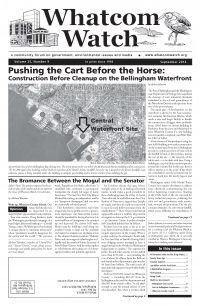by Nicole Oliver
To celebrate 25 years of publishing Whatcom Watch, we will be printing excerpts from 20 years ago. The below excerpts are from the September 1996 issue of Whatcom Watch.
Susie Stephens of the Northwest Bicycle Federation made a presentation to the Bellingham City Council at its August 26 [1996] meeting. Susie was invited by the Bellingham Bicycle Advisory Committee [now part of the Transportation Commission] to promote awareness of the need for bicycle and pedestrian friendly community design. The advisory committee was created by the City Council and the mayor in 1992 to advise the council on bicycle transportation issues, to write grants, and to examine our community for areas that need improvement in regards to bicycle safety. The committee has started a program developed in Seattle which utilizes printed note cards, available at area bike shops, that ask for input on unsafe roadway conditions. The cards are pre-printed to easily send on to Steve Haugen at the Public Works Department. It is estimated that about half of the suggested problems have been eliminated through this program.
Northwest Bicycle Federation
The Northwest Bicycle Federation has been around for 10 years. Their motto: More people bicycling more often — safely. For the last six years, Northwest Bicycle Federation has focused on the spending of transportation dollars awarded by the federal government to each state through a transportation funding bill (1.8 percent of all road construction dollars must be set aside for citizen participation and mitigation projects in connection with bicycles, pedestrians, greenways, historic preservation and several other uses). Each state may decide how to utilize the allotted fund, and according to Stephens, Washington has done the best job in the country of maximizing these funds. In the last few years, Northwest Bicycle Federation has focused more on growth management issues and design, so there is an indisputable connection between transportation and land use.
In an attempt to promote people-oriented development rather than car-oriented, Northwest Bicycle Federation believes all people, no matter what their mode of transportation, should be able to get anywhere in their community — safely. Twenty-five percent of Washingtonians don’t drive due to age, money, ability or choice. User fees from gas taxes and vehicle excise taxes pay for about 60 percent of roadway improvements. Therefore, the other 40 percent of improvements come out of the general fund, subsidized by taxpayers who may not actually be driving.
Car-oriented Society
Examples of our car-oriented society (besides the obvious ones apparent from looking out the window of any city home or building), include the fact that schools are subsidized by the number of bus routes they have. Most schools in Washington are 100 percent bused, though only 20 years ago many schoolchildren walked to school (myself included). Bicycles and pedestrians subsidize the automobile use of ferries. It is cheaper to take three bikes and three adults in a car to Lopez Island than to bike on. And of course there is our recent move by the City Council to spend $10,000 to remove trees to improve the view of the bay from Boulevard Street and the apartments above it. Though I don’t live there or pay the possibly excessive property taxes for an apartment with only a six-month bay view, I still find the fact that our City Council unanimously approved this to be astonishing.
The purpose of Stephens presentation was to promote the new studies that show that the strip malls are not so popular anymore, that green-friendly sidewalks and pedestrian and bicycle access make a community more livable, and that revitalized downtowns are more appealing than the nationwide clone stores that have miraculously duplicated and spread all over the country. Bellingham has some wonderful bicycle and pedestrian areas. The paved trail from South State Street, along a downtown alley and across Whatcom Creek is a marvelous, safe place for bicyclists. With the new studies showing the trends toward renewed downtowns and away from strip-mall shopping, our city has the option of embracing people-oriented design that accommodates all individuals and not just those in cars.
_________________________________
Nicole Oliver is a former Whatcom Watch editor and a current member of the Whatcom County Planning Commission.




























